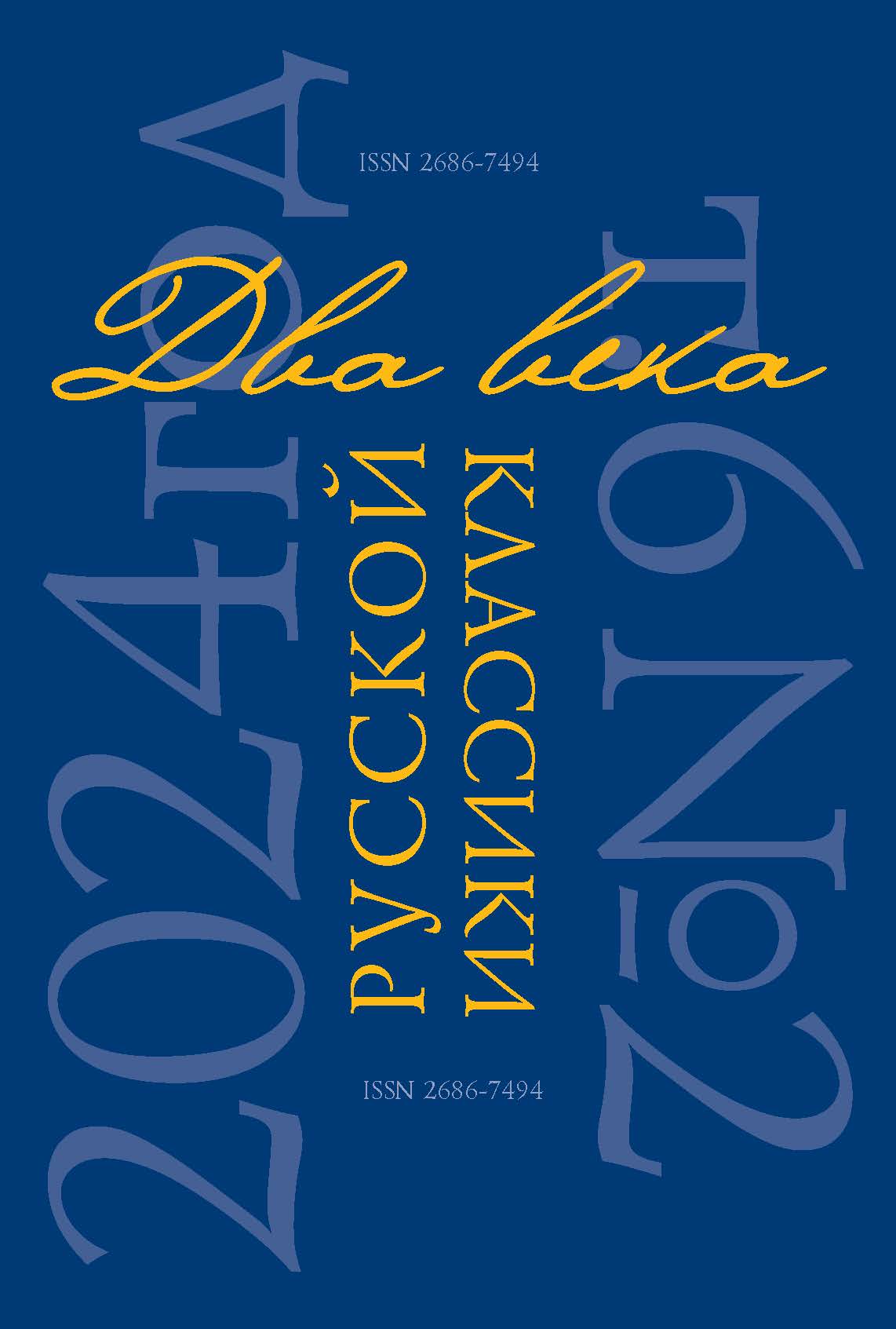Abstract: The article examines the images of three landowners — Tentetnikov from the second volume of “Dead Souls” by N. V. Gogol, Oblomov from the novel of the same name by I. A. Goncharov, and Lavretsky from “The Noble Nest” by I. S. Turgenev — which stand out among the literary representatives of this social group have a common crucial property — laziness. Traditionally, these characters are usually brought together based on belonging to the “superfluous person” type, but this does not shed light on the reasons for their similarities. The article proposes to look for its foundations in a general literary source, which is the “Divine Comedy” and, in particular, in the image of the lazy Belacqua from the second cantica. In this regard, the mediation of S. P. Shevyrev, whose interpretation of Dante influenced Gogol and Goncharov, is significant. In the works of writers, there is an interpretation of spiritually criminal lazy apathy. Belacqua is too lazy to save himself. The responsibility for awakening lies upon the person himself — this Dantean idea appeared close to both Gogol and Goncharov. In the case of Lavretsky, we are already dealing with Goncharov’s mediation in the adaptation of Dante’s ideas.
References
Beliaeva, I. A. I. A. Goncharov-romanist: dantovskie paralleli [I. A. Goncharov as a Novelist: Dante’s Parallels]. Moscow, Moscow State Pedagogical University Publ., 2016. 214 p. (In Russ.)
Beliaeva, I. A. “Dante kak skrytaia prichina spora: k voprosu o konflikte I. A. Gon- charova s I. S. Turgenevym” [“Dante as a Hidden Reason for Dispute: To the Issue of the Conflict Between I. A. Goncharov and I. S. Turgenev”]. Filologicheskii klass, vol. 26, no. 1, 2021, pp. 190–205. https://doi.org/10.51762/1FK-2021-26-01-16 (In Russ.)
Beliaeva, I. A. “Iz istorii russkoi danteany: o perevode ʽBozhestvennoi Komedii’ na russkii iazyk E. V. Kologrivovoi” [“From the History of Russian Danteana: On the Translation of the ʽDivine Comedy’ into Russian by E. V. Kologrivova”]. Poeziia filologii. Filologiia poezii [Poetry of Philology. Philology of Poetry], vol. 3. Tver, A. N. Kondratiev Publ., 2020, pp. 52–63. (In Russ.)
Beliaeva, I. A. “ʽStrannye sblizheniia’: Goncharov i Dante” [“ʽStrange Encounters’: Goncharov and Dante”]. Izvestiia Rossiiskoi akademii nauk. Seriia literatury i iazyka, vol. 66, no. 2, 2007, pp. 23–38. (In Russ.)
Vinogradov, I. A. “ʽLishnie liudi’ v russkoi literature: slovo Gogolia” [“ʽSuperfluous Men’ in Russian Literature: Gogol’s View”]. Studia Litterarum, vol. 4, no. 3, 2019, pp. 188– 209. https://doi.org/10.22455/2500-4247-2019-4-3-188-209 (In Russ.)
Gol’denberg, A.Kh. “ʽGogol’ i Dante’ kak sovremennaia nauchnaia problema” [“ʽGogol and Dante’ as a Modern Scientific Problem”]. Dante Alig’eri: pro et contra. Lichnost’ i nasledie Dante v otsenke russkikh myslitelei, pisatelei, issledovatelei [Dante Alighieri: Pro et Contra. The Personality and Legacy of Dante in the Assessment of Russian Thinkers, Writers, Researchers], vol. 2. St. Petersburg, Russian Christian Academy for the Humanities Publ., 2019, pp. 547–559. (In Russ.)
Grodetskaia, A. G., S. N. Gus’kov, N. V. Kalinina, T. I. Ornatskaia, M. V. Otradin, A. V. Romanova, and V. A. Tunimanov. “Oblomov: Roman v chetyrekh chastiakh. Primechaniia” [“Oblomov: A Novel in Four Parts. Comments”]. Goncharov, I. A. Polnoe sobranie sochinenii i pisem: v 20 t. [Complete Works and Letters in 20 vols.], vol. 6. St. Petersburg, Nauka Publ., 2004, pp. 5–610. (In Russ.)
Gus’kov, S. N. “Goncharov i Gogol’: ob odnom paradokse v istorii teksta ʽOblomova’.” [“Goncharov and Gogol: About One Paradox in the History of the Text ‘Oblomov’.”] Oblomov: konstanty i peremennye: sbornik nauchnykh statei [Oblomov: Constants and Variables. Collection of Scientific Articles]. St. Petersburg, Nestor-Istoriia Publ., 2011, pp. 124–132. (In Russ.)
Il’in, V. N. “Prodolzhenie ʽMertvykh dush’ u Goncharova” [“Continuation of ʽDead Souls’ by Goncharov”]. Master russkogo romana: I. A. Goncharov v literaturnoi kritike russkogo zarubezh’ia [Master of the Russian Novel: I. A. Goncharov in Literary Criticism of Russian Diaspora]. Moscow, Tsentr knigi Rudomino Publ., 2012, pp. 322–361. (In Russ.)
Kalinina, N. V. “Dantovy koordinaty romana ʽObryv’.” [“Dante’s Coordinates of the Novel ʽThe Escape’.”] Russkaia literatura, no. 2, 2012, pp. 67–80. (In Russ.)
Krasnoshchekova, E. A. I. A. Goncharov: Mir tvorchestva. [I. A. Goncharov: The World of Creativity]. St. Petersburg, Pushkinskii fond Publ., 1997. 496 p. (In Russ.)
Krasnoshchekova, E. A. Roman vospitaniia — Bildungsroman — na russkoi pochve: Karamzin. Pushkin. Goncharov. Tolstoi. Dostoevskii. [A Novel of Education — Bildungsroman — on Russian Soil: Karamzin. Pushkin. Goncharov. Tolstoy. Dostoevsky]. St. Petersburg, Pushkinskii fond Publ., 2008. 480 p. (In Russ.)
Larin, S. A. “ʽNarushenie voli’ (K funktsii alkogol’nykh motivov v romane I. A. Goncharova ʽOblomov’’)” [“ʽViolation of Will’ (On the Function of Alcoholic Motifs in I. A. Goncharov’s Novel ʽOblomov’)”]. Goncharov: zhivaia perspektiva prozy [Goncharov: A Living Perspective of Prose]. Szombathely, University of West Hungary Press, 2012, pp. 213–229. (Bibliotheca Slavica Savariensis. Vol. XIII). (In Russ.)
Mann, Iu. V. Poetika Gogolia. Variatsii k teme [Gogol’s Poetics. Variations on a Theme]. Moscow, Coda Publ., 1996. 474 p. (In Russ.)
Mann, Iu. V. “ʽIstinno lishnii chelovek’ (Zametki o tipologii kharaktera)” [“ʽA Truly Superfluous Person” (Notes on the Typology of Character)”]. Mann, Iu. V. Turgenev i drugie [Turgenev and Others]. Moscow, Russian State University for the Humanities Publ., 2008, pp. 13–29. (In Russ.)
Mel’nik, V. I. “I. A. Goncharov i Dante: voprosy poetiki” [“I. A. Goncharov and Dante: Questions of Poetics”]. Dva veka russkoi klassiki, vol. 3, no. 4, 2021, pp. 58–79. https://doi.org/10.22455/2686-7494-2021-3-4-58-79 (In Russ.)
Mel’nik, V. I. Goncharov i pravoslavie: Dukhovnyi mir pisatelia [Goncharov and Orthodoxy: The Spiritual World of the Writer]. Moscow, Dar” Publ., 2008. 544 p. (In Russ.) Mel’nik, V. I. “Problema romannoi trilogii I. A. Goncharova i ego konflikt s
I. S. Turgenevym” [“The Problem of Novel Trilogy of I. A. Goncharov and His Conflict with I. S. Turgenev”]. Verkhnevolzhskii filologicheskii vestnik, no. 2 (21), 2020, pp. 17–28.https://doi.org/10.20323/2499-9679-2020-2-21-17-28 (In Russ.)
Moshonkina, E. N. “Perevodcheskaia retseptsiia ʽBozhestvennoi Komedii’ v XIX v. v Rossii i vo Frantsii: popytka sopostavitel’nogo analiza” [“Translation Reception of the ʽDivine Comedy’ in the 19th Century in Russia and France: An Attempt at Comparative Analysis”]. Vestnik Moskovskogo universiteta. Seriia 22. Teoriia perevoda, no. 3, 2013, pp. 110–121. (In Russ.)
Nedzvetskii, V. A. I. A. Goncharov — romanist i khudozhnik [I. A. Goncharov as a Novelist and Artist]. Moscow, Moscow State University Publ., 1992. 176 p. (In Russ.)
Sapchenko, L. A. “Oblomov kak pomeshchik” [“Oblomov as a Landowner”]. I. A. Goncharov. Materialy Mezhdunarodnoi nauchnoi konferentsii, posviashchennoi 195-letiiu so dnia rozhdeniia I. A. Goncharova [I. A. Goncharov. Proceedings of the International Scientific Conference Dedicated to the 195th Anniversary of the Birth of I. A. Goncharov]. Ulyanovsk, Nika-dizain Publ., 2008, pp. 119–128. (In Russ.)
Sapchenko, L. A. “Russkii pomeshchik (K tipologii literaturnogo geroia)” [“Russian Landowner (Toward the Typology of a Literary Character)”]. Deviatye Gogolevskie chteniia. N. V. Gogol’ i russkaia literatura. K 200-letiiu so dnia rozhdeniia pisatelia [Ninth Gogol Readings. N. V. Gogol and Russian Literature. To the 200th Anniversary of the Writer’s Birth]. Moscow, Festpartner Publ., 2010, pp. 120–127. (In Russ.)
Sapchenko, L. A. “Russkii pomeshchik Lavretskii” [“Russian Landowner Lavretsky”]. Gogol’ i puti razvitiia russkoi literatury. Sbornik nauchnykh statei po materialam Mezhdunarodnoi nauchnoi konferentsii. K 200-letiiu I. S. Turgeneva. Vosemnadtsatye Gogolevskie chteniia [Gogol and the Ways of Development of Russian Literature. Collection of Scientific Articles Based on the Materials of the International Scientific Conference. To the 200th Anniversary of I. S. Turgenev. Eighteenth Gogol Readings]. Moscow, Novosibirsk, Novosibirsk Publishing House, 2019, pp. 108–114. (In Russ.)
Tseitlin, A. G. I. A. Goncharov [I. A. Goncharov]. Moscow, Academy of Sciences of the Soviet Union Publ., 1950. 492 p. (In Russ.)
Chuiko, V. V. “Ivan Aleksandrovich Goncharov. Opyt literaturnoi kharakteristiki” [“Ivan Aleksandrovich Goncharov. The Experience of Literature Characteristic”]. Nabliudatel’, no. 12, 1991, pp. 109–127. (In Russ.)









